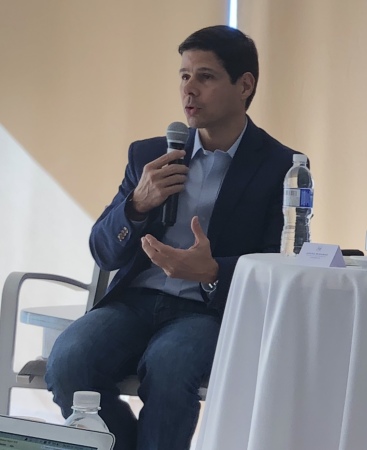For Mexican fleet, Canada and U.S. represent opportunity and challenges
PUERTO VALLARTA, Mexico – The demise of NAFTA was a worrying experience for Fernando Paez, owner and CEO of Olympic Transport, which has built a successful business out of trucking from Mexico to the U.S. and Canada.
But he’s optimistic a new trade deal will be ratified and will keep in tact cross-border business opportunities. Olympic Transport was the first Mexican carrier to be certified to haul freight into the U.S. and Canada. Paez seized the opportunity to provide a single source solution for cross-border shippers, reducing time that came with swapping trailers with U.S. carriers at the border zone.

With that opportunity came unique challenges, including training drivers on how to speak English and preparing them for what can be intimidating encounters with enforcement in the U.S and Canada. Part of the orientation at the company involves ensuring drivers have adequate English language skills, and training them on how to communicate with enforcement. This includes rehearsals where drivers are questioned by company staff, posing as enforcement officers.
“When we have a Mexican driver going across the border and there’s an inspection, sometimes the police officers can be a little bit intimidating, because usually they’re taller, they’re very well dressed with their uniforms, and they may be very strict and very rigid,” Paez explained during a Freightliner press event on the Mexican market Nov. 29. “So, if the operator is not well prepared and we haven’t given him the right training, he is going to feel intimidated. I’m talking about any type of authority in Mexico and the U.S. We teach them how to answer, to look into their eyes and say ‘Yes, sir. I speak English.’ The way they introduce themselves to the officer and the way they talk to him is very important. We ask them to be kind.”
The training even involves mock meetings with enforcement officers.
“We attack him about the load: ‘where are you going?’ We want him to feel that pressure so that tomorrow when he goes to a real inspection, he already knows what it feels like and they already received the right training to be able to respond to a real inspection,” Paez explained.
He also dispelled myths about the safety of Mexican operators. Olympic Transport operates new equipment, with an average tractor age of four years. In fact, when the cross-border trucking program between the U.S. and Mexico was in discussion, he sent a truck to Washington, D.C. where it was placed beside a U.S. truck. Enforcement officers were unable to identify the Mexican truck.
The company has been in business for 29 years, and Paez traveled to San Antonio, Texas to make his first truck purchase. He visited all the local dealers and decided on a Freightliner, and has been loyal since. Paez said he likes the Detroit power and the after-sales support he receives.
“If we face a problem with our units, we will have someone we can call who will help us and that will solve the difficulties that may arise. This, for us, is extremely important,” he said.
He also appreciates the spec’ing support the company receives from the truck maker.
“It’s very important for us to have the best spec’,” he said. “There are thousands of combinations you can have with a tractor unit.”
Olympic Transport is a progressive fleet, that operates modern equipment and uses electronic logging devices – even before the requirement in the U.S. As in the U.S. and Canada, a driver shortage is one of the biggest challenges facing the industry. Paez tackles it by offering thorough training, good equipment and attractive pay packages. The company has 140 tractors and 175 employees. The fleet averages 3.5 kilometers per liter, or 8.2 mpg.
As a cross-border carrier, Paez also looks north of the border for inspiration. He recently made a trip to Little Rock, Arkansas to visit a partner carrier and was surprised to see how well drivers there were doing.
“They’re being paid 60 cents a mile – that’s something I’ve never seen before. And the company is guaranteeing 3,000 miles per week, which is a very important number. To see there are not enough drivers is a little difficult to believe,” he said.
At Olympic Transport, Paez focuses on the treatment of its drivers.
“It’s not always about money,” he said. “It’s about how you treat the driver, and the value you are giving him.”
The company recently began a campaign in which it offers drivers special experiences, such as training meetings in nice locales that include entertainment.
“It takes them out of their routine and at the same time we can train them and motivate them,” he said.
As for the trade agreement, Paez is grateful a deal was reached and for good reason – 95% of its business is cross-border.
“I think it’s an important topic, because without an actual free trade agreement for the North American market, we would have lost competitiveness enormously,” he said, adding he’s confident the new Mexican administration will sign the deal. “I believe it will help us grow as a company and a country.”
Have your say
This is a moderated forum. Comments will no longer be published unless they are accompanied by a first and last name and a verifiable email address. (Today's Trucking will not publish or share the email address.) Profane language and content deemed to be libelous, racist, or threatening in nature will not be published under any circumstances.